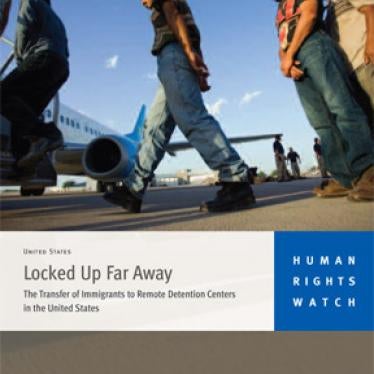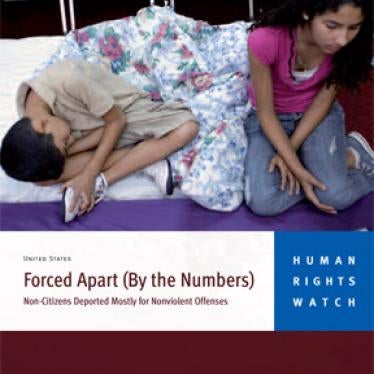Updated to correct terminology
(San Francisco) - The US Immigration and Customs Enforcement (ICE) should end immediately the indefinite detention of two immigrants with mental disabilities held for over four years, Human Rights Watch said today. Lawsuits were filed today on behalf of the two men with US federal district courts in California.
The lawsuits allege that the two men, Jose Antonio Franco, 29, and Guillermo Gomez-Sanchez, 48, have been held for more than four years in immigration detention in violation of the right to freedom from indefinite detention and the right to a fair hearing to contest the basis for their detention. Gomez-Sanchez is a legal permanent resident, and Franco is the son of two legal permanent residents.
Franco, who has an intellectual disability, does not know his own age and cannot tell time. Gomez-Sanchez has been diagnosed with paranoid schizophrenia. The two have been transferred by ICE among various facilities without the opportunity to present their claims against deportation because the agency lacks fair policies on how to handle such cases.
"A person who cannot tell time is unlikely to recognize that he's spent four years of his life in detention," said Sarah Mehta, Aryeh Neier fellow with Human Rights Watch and the American Civil Liberties Union (ACLU), which filed the suits. "The courts need to intervene in cases like these to keep people from getting lost in the labyrinth of immigration detention."
Franco has never received a bond hearing to determine whether he can be released to the care of his family, who are lawfully residing in the United States. Gomez-Sanchez did receive such a hearing, but the government appealed the judge's decision to release him on bond. Neither man has been able to proceed to the final deportation hearing phase, where their status in the US would be finally resolved.
The absence of safeguards and procedures has resulted in prolonged indefinite detention and denied both men a fair hearing, said the men's lawyers, who are with California affiliates of the ACLU, the Public Counsel Law Center in Los Angeles, and the Casa Cornelia Law Center in San Diego. The lawsuits were filed in the districts where Franco and Gomez-Sanchez are currently held in detention facilities; Franco's case was filed in federal court in the Central District of California and Gomez-Sanchez's case was filed in the Southern District of California.
Mehta, who has been investigating ICE's treatment of persons with mental disabilities for the past eight months, has found that these two cases, while extreme, are not unique. Immigrants, including those legally in the United States, are routinely detained when ICE alleges that they are subject to deportation after they have completed serving sentences for crimes. They remain in detention during the deportation hearings. However, the detention becomes unduly prolonged when the immigrants have mental disabilities, are unable to advocate for themselves, and hearings cannot or should not justifiably proceed. ICE has failed to develop fair policies and procedures for handling such cases.
A Human Rights Watch report on the issue, to be published in late 2010, will raise profound concerns about the absence of established procedures for release from immigration detention and procedures in immigration court for handling cases when a person is deemed incompetent due to a mental disability. Detention combined with the lack of courtroom procedures for persons with mental disabilities result in violations of the right to fair proceedings and the right to be free from arbitrary detention under international human rights law.
"Immigrants with mental disabilities currently appear in immigration court without the right to counsel or any special accommodations for their inability to comprehend their situation," Mehta said. "ICE needs to enforce immigration law - that is its job - but it needs to ensure basic fairness for people who are clearly disadvantaged, and sometimes even lost, in the system."








